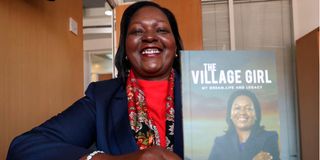My encounter with a girl named Mary Wangari

Mary Wamae Wangari, former group executive director for Equity Holdings and the author of The Village Girl book during an interview at Nation Centre in Nairobi on July 22, 2024.
What you need to know:
- As a former banking lecturer, I was stunned to discover Mary Wangari's book.
- Though I lived through the harsh Mau Mau period, I never knew about this extraordinary daughter of Tetu who transformed from a struggling lawyer to a banking powerhouse.
- What amazes me most is that she shares her birthplace with Nobel laureate Wangari Maathai, making our Tetu village the cradle of two of Kenya's most powerful women.
Until I stumbled upon a curiously bound book on my table, I had never heard of Mary Wangari, much less referred to as a “village girl.” As I began reading, the truth struck me like a bullet: I should have known about her, as she is a leading figure in Kenya's banking sector — a field I am quite familiar with as a former financial mentor for my students during my time as a university lecturer.
In my usual style, once I pick an interesting book, I feel compelled to read it to the end. That's why I finished this little book overnight; it's a quick read at just 111 pages. Amazing! How could I have overlooked the prominent figure at the bank that I’ve been keeping on my radar since it was founded by my neighbour, Peter Munga, in 1984? Even its well-known CEO, Dr James Mwangi of Equity Group, was someone I consider a “classmate”— our private code name for fellow student — during my time at the University of Nairobi. I used to lecture there, and I learned as a lecturer that you cannot teach a student anything directly; you can only help them uncover what their creator has placed within them.
Saba Saba Day
Wangari, a lawyer turned banker, embodies an inspiring story of a village girl. If you are not from the Gikuyu country, you may not understand what life in a village is like, but I can tell you. It reflects one of the harshest legacies left to the Gikuyu people of Kenya during the Mau Mau rebellion from 1952 to 1960. The colonial government brutalised locals. I lived through that difficult time, filled with hardship and jiggers, when I was in primary school. I prefer not to recall that period.
Unlike me, Wangari, who was born well after the end of that period on a date that would become famous: Saba Saba Day in 1968, has a different perspective. She even wishes that the same “village” concept could be applied to redefine Kenyan rural life today. She believes it could promote the development of rural towns, similar to what I observed in parts of modern-day Germany. This approach could also help increase our arable land, particularly in my korera (in-laws) called Gusiiland, which is currently in a dreadful state. That's a story for another day.
After a challenging start to her career following graduation with an upper second-class honours degree in law, she struggled to establish her own legal firm in Nairobi's rapidly expanding CBD. It was during this time that Mwangi, the then Managing Director of Equity Bank, visited her office and offered her a chance to serve as lawyer for a significant financial deal worth millions of dollars. Overwhelmed by the opportunity, she made a pivotal decision to accept the challenge. As a lawyer lacking experience in large financial transactions, she knew she had to find a way to succeed and secure the deal for Equity.
Climbing the ladder
As the saying goes, that was her turning point. She transitioned from being a lawyer to a banker, ultimately climbing the ladder to become the CEO of Equity Bank, which is now the largest bank in Kenya with a capitalisation of Sh146 billion ($1.2 billion). The bank has expanded throughout Central Africa, reaching what can be described as a veritable goldmine called the Democratic Republic of Congo (DRC).
This success is attributed to having a truly visionary banker and team leader who served as the Chairperson of President Mwai Kibaki’s Vision 2030 Project. This serves as a challenge to our youth with degrees: if you knew that Mwangi also started as a village boy in Nyagatugu, Murang’a County, and became the Bill Gates of Kenya, you might reconsider looking abroad for employment when job opportunities are emerging in your own country, which is increasingly being targeted by foreign investors like the controversial Gautam Adani.
Little book
If you need convincing, simply go to the roof of the Kenyatta International Convention Centre and take a look at Nairobi’s skyline, which is still expanding upwards. Alternatively, visit the iconic UAP Tower in Upper Hill, a building constructed by the late legendary JB Wanjui, who was also the landlord of Equity Holdings in the same area.
Thank you, Wangari, for writing such a short yet amazing little book. I will find a way to make your book join the ranks of successful titles like Rich Dad Poor Dad and others.
If a poor village girl from Tetu, born to a single mother, can achieve so much, what’s stopping you girls and boys from discovering your true value? You can accomplish this after reading this remarkable book titled A Village Girl.
Interestingly, her birthplace is the same as that of the late Prof Wangari Maathai, Kenya’s only Nobel Prize winner. They share more similarities than Mary Wangari, the banker, may even realise. Perhaps, she could consider Maathai as a role model.
I could be wrong.
JH Kimura, PhD (Another village boy)




